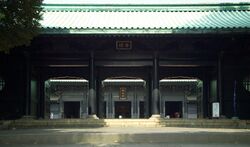Hayashi Hōkō
Topic: Philosophy
 From HandWiki - Reading time: 2 min
From HandWiki - Reading time: 2 min
Hayashi Hōkō | |
|---|---|
 Hayashi Hōkō, 1st rector of Yushima Seidō | |
| Born | 1644 Edo |
| Died | 1732 Edo |
| Occupation | Neo-Confucian scholar, academic, administrator, writer |
| Subject | Japanese history, literature |
| Children | Hayashi Ryūkō, son |
| Relatives | Hayashi Gahō, father Hayashi Razan, grandfather |
Hayashi Hōkō (林 鳳岡, January 11, 1644 – July 22, 1732), also known as Hayashi Nobutatsu, was a Japanese Neo-Confucian scholar, teacher and administrator in the system of higher education maintained by the Tokugawa bakufu during the Edo period. He was a member of the Hayashi clan of Confucian scholars.
Hōkō was the tutor of Tokugawa Tsuneyoshi.[1]
Following in the footsteps of his father, Hayashi Gahō, and his grandfather, Hayashi Razan, Hōkō would be the arbiter of official neo-Confucian doctrine of the Tokugawa shogunate. As a result of his urging, the shōgun invested Confucian scholars as samurai.[1]
Academician
Hōkō was the third Hayashi clan Daigaku-no-kami of the Edo period. After 1691, Hōkō is known as the first official rector of the Shōhei-kō (afterwards known as the Yushima Seidō) which was built on land provided by the shōgun.[1] This institution stood at the apex of the country-wide educational and training system which was created and maintained by the Tokugawa shogunate. Gahō's hereditary title was Daigaku-no-kami, which, in the context of the Tokugawa shogunate hierarchy, effectively translates as "head of the state university.[2]
The scholars of the Hayashi school were taught to apply what they had learned from a Confucian curriculum. Typically, they applied the Confucian texts conservatively, relying on Soong Confucian anlayis and metaphysical teachings.[3]
The neo-Confucianist scholar Arai Hakuseki generally expressed scant regard for opinions expressed by Hayashi Hōkō.[3]
Selected works
- Kai hentai (Chinese Metamorphosis), reports of Chinese junks arriving in Nagasaki, 1640–1740.[4]
See also
- Hayashi clan (Confucian scholars)
Notes
- ↑ 1.0 1.1 1.2 Nussbaum, Louis Frédéric et al. (2005). Japan Encyclopedia, p. 300.
- ↑ De Bary, William et al. (2005). Sources of Japanese Tradition, Vol. 2, p. 443.
- ↑ 3.0 3.1 Arakai, James et al. (2008). Early Modern Japanese Literature: an Anthology, 1600-1900, p. 378 n12.
- ↑ Tarling, Nicholas. (1998). The Cambridge History of Southeast Asia, Vol. 1, p. 161.
References
- Arakai, James T. and Haruo Shirane. (2008). Early Modern Japanese Literature: an Anthology, 1600–1900 (abridged). New York: Columbia University Press. ISBN:978-0-231-10990-1/ISBN:978-0-231-10991-8/ISBN:978-0-231-14414-8/ISBN:978-0-231-144155; OCLC 255022419
- De Bary, William Theodore, Carol Gluck, Arthur E. Tiedemann. (2005). Sources of Japanese Tradition, Vol. 2. New York: Columbia University Press. ISBN:9780231129848; OCLC 255020415
- Nussbaum, Louis Frédéric and Käthe Roth. (2005). Japan Encyclopedia. Cambridge: Harvard University Press. ISBN:978-0-674-01753-5; OCLC 48943301
- Tarling, Nicholas. (1998). The Cambridge History of Southeast Asia. Vol. 1. Cambridge: Cambridge University Press . ISBN:978-0-521-77864-0; ISBN:978-0-521-66369-4; ISBN:978-0-521-66370-0; ISBN:978-0-521-66371-7; ISBN:9780521663724; OCLC 43674066
External links
| Preceded by Hayashi Gahō |
1st rector of Yushima Seidō 1691–1732 |
Succeeded by Hayashi Ryūkō |
 KSF
KSF
